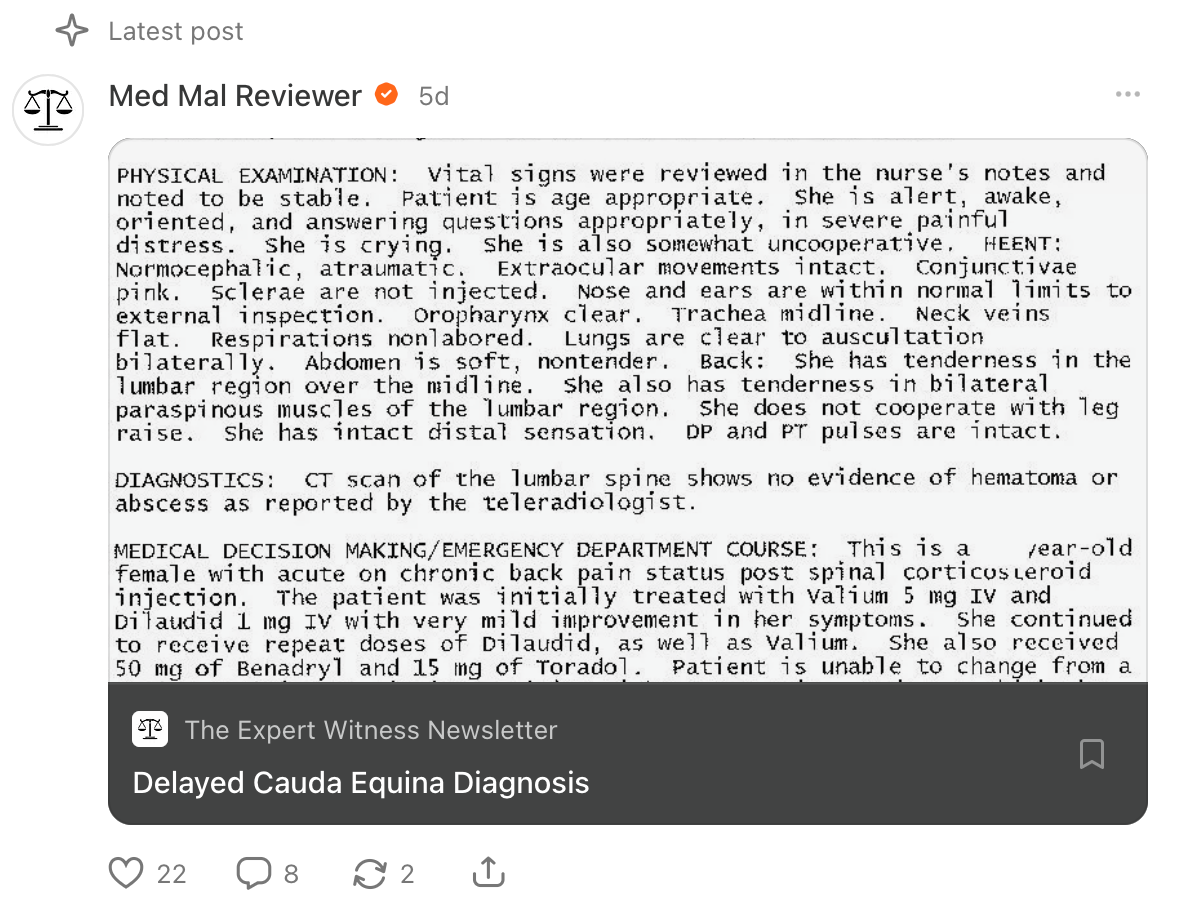Documentation & Charting Pearls: Efficiency, Medicolegal and More

I first learned about the importance of documentation during a clinical rotation; one of the old nurses admonished a newer grad nurse that "if it's not documented, it wasn't done."
For some reason, that phrase stuck with me and I found myself repeating it over the years. No matter what type of documentation you do (whether it's on paper, hybrid or electronic (via an EMR)), the basis is the same: document, document, document.
Here's my tutorial on how to make your own differential diagnosis drop-down in Epic, and here's my personal DDx list on my storefront.
To get links to my favorite podcasts about the importance of documentation, scroll straight to the bottom of this blog post.
So, let's get into documentation: why it's important and how to get better.
My biggest qualm with documentation is that no one teaches you how to do it. My residency definitely didn't. We were thrown into shifts and learned how to write notes on the go, which meant that whoever happened to be next to you would pass on their own way of documenting. This method had it's flaws, as not everyone is by default good at writing notes, and there was little-to-no standardization of the process.
I still don't think my notes are great, but I'm learning every day. Here are some key principles to keep in mind:
"If you don't document it, it wasn't done."
Documentation is so important for patient care. Especially in emergency medicine, but honestly, in every single field where we hand off care to another team (be it specialist or other primary teams).
I can't remember the number of times I scramble to figure out what happened to a patient and why. Why did they order a CTA, what were they worried about? Did this patient get acetaminophen for their fever, and if they did, why's it not in their chart? Why are they holding the sepsis fluid bolus (and are we going to "fail sepsis")? The list of unanswered questions after a handoff is endless and if you work in medicine, you probably relate.
Efficiency
In first year, I would stay HOURS late after some shifts to finish notes, or I would do notes on my days off, which made me bitter and unhappy.
With time, I became more efficient. Now when I watch the interns doing what I did 2 years ago, I see myself in them and it makes me sad. I don't know how to teach you to be more efficient, but here are some tips that will help:
- create really really good templates: I have three types of templates:
- generic ED adult patient
- generic fast track adult patient (simpler note for those "med refill" or "ear pain" cases)
- generic ED pediatric patient
- I finetune these every couple of months as I get better and my focus/style changes. I will take these with me as Google Docs to my future jobs because these templates have made my life so much easier
- watch other people: each time I see someone navigate through our EMR, I learn a new tidbit
- for instance, I didn't realize that you could pull two EKGs up next to each other and damn, it's a game-changer. I learned this a few weeks ago by watching one of my co-residents during sign-out.
- learn keyboard shortcuts: massively underrated life skill that I fully believe everyone should master
- planning on writing a blog post on Epic shortcuts alone, but don't wait to start
- this video on TikTok went viral because it's so simple and so few people knew about it!
- [but do subscribe to my blog for updates!]
Include a differential diagnosis
When I started out, I was taught to not include things that I wasn't going to work up. "If you put it on there, you have to test for it" was the mantra, and the idea was that you didn't want to have to do a CT PE for every pleuritic chest pain. I operated under this assumption for years. But Episode 387 from EM Crit (see below) taught me that that's not the right mindset at all.
You can be sued for not considering a diagnosis. This means that you should consider things broadly, and explain why you don't think it's XYZ.
Another misconception: you have to work up everything on your differential with testing. That's not strictly true. You have to explain why you don't think it's a certain diagnosis, yes, but this conclusion can be reached by things other than bloodwork and imaging.
- For example: A 26 year old female with pleuritic chest pain - pulmonary embolism should be on your differential, but in the right clinical context, you don't need to obtain a d-dimer level or CTA of the chest to rule it out. You can document general appearance, vitals, PERC score and justify your workup (or "lack there of") that way.
Protecting yourself, your team and your patient
My attendings always talked a lot about documentation, for many different reasons, and I never really understood it. For years I would resisted the "document for billing" purposes, and I still struggle with that. But the reality of the world we practice medicine in is that money matters. Your employer will care, so while this blog post is not about how to write your notes to satisfy billing needs, that is an unfortunate byproduct of the American healthcare system and is something you will likely have to think about.
More important than that is the idea that documentation explains your medical decision making and protects you, legally. Contrary to popular belief, if your patient leaves AMA, having them sign an AMA form does not protect you if harm comes their way. Having an extensive conversation about the risks, alternatives, etc. and documenting that, does.
If you chose to do (or not do) something for your patient and clearly explain why or why not, you can actually protect yourself appropriately, as long as you are following the standard of care.
One of my favorite phrases in documentation has become "using shared decision making, ..." As we've moved away from the paternalistic medicine of the 20th century, healthcare has become more of a conversation. It's helpful to discuss (and write down) the things that you and the patient/family feel are important and explain why they are choosing the path that they are.
Principles of Good Documentation
I was hesitant to write this blog post because I am not a lawyer nor a medicolegal expert, and again, I am learning things slowly. I'm largely self-taught, but I wanted to impart some of the wisdom that has been passed down onto me.
My notes are mainly emergency medicine notes, so this blog post is tailored toward that specialty.
So here are some key bullet points:
- Good documentation saves lives & licenses. What you write matters.
- Scores are your best friend: Scores are evidence-based ways to defend your thought process, and to help you explain why you decide not to pursue a certain workup or disposition.
- The PERC score is a great example.
- TIP: Download MDCalc, a free app, and make an account (it's free!). This way you can save your most commonly used scores.
- Just writing "patient signed AMA forms" does not protect you legally.
MedMal resources
Medical malpractice is not something I recommend for medical students or junior residents. I think it's important to learn the basics of clinical medicine and develop your own practice early on, and only then should you start thinking about medmal.
Here are some amazing resources that I stumbled upon recently:
- MedMal Insiders (podcast): this is FREE and extremely bingeable. I listened to all the episodes, some more than once.
- MedMal Reviewer (newsletter): free, with a paid option (which I haven’t been able to afford yet, but pending that attending money). These are long-winded cases that are also fascinating – you can learn so much.

- EM Crit (paid episode of free podcast): this episode changed the way I chart.
- EMCrit 387 – Emergency Department Charting for Legal Protection and Patient Safety
- Note: EMCrit has a great free podcast but this episode is part of their Subscribers Only feed. For medical students and residents, this subscription is approximately $20 and so completely worth it. Every trainee should sign up while they can; you just have to send in a proof of residency in the form of a hospital ID
- The L Word: Doctors and Litigation by Dr. Gita Pensa: a podcast that covers the emotional/psychological effects of litigation, and tips and advice.
PS. I'm trying a new podcast app called GoodPods; it's like GoodReads for podcasts, where you can follow each other, recommend episodes, and share thoughts about episodes. Click here to add me as a friend – I follow back all medically-minded folk with similar tastes. It's a new app and the UI is a little buggy, but I'm hopeful.



